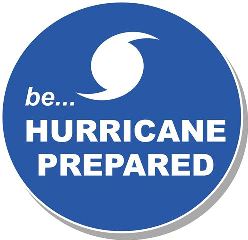Did you know it’s National Hurricane Preparedness Week?
National Hurricane Preparedness Week, May 6-12, is a week long reminder to everyone that hurricane season is approaching. Learn ways to plan ahead for safety, evacuations, flooding, shortages, and cleanup.
Be ready before disaster strikes. And you can start by planning now. We’ve assembled some helpful hurricane preparedness tips to make your prep easier.
Here are a few reminders of how to plan and also what not to do:
DO:
1. Get your supplies:
- Water (one gallon of water per person per day for at least three days, for drinking and sanitation)
- Non-perishable foods (at least a three-day supply)
- Batteries & flashlights
- Battery powered radio
- Baby items if applicable (food, diapers, formula, wipes, medications if needed, extra clothing)
- Pet supplies if applicable (food, medicine if needed, extra cage, leash, collars & tags, medical records)
- Cash
- First Aid kit
- Whistle to signal for help
- Dust mask (to help filter contaminated air), plastic sheeting and duct tape
- Moist towelettes, garbage bags and plastic ties for personal sanitation
- Wrench or pliers to turn off utilities
- Manual can opener for food
- Local maps
- Cell phone with chargers, inverter or solar charger
- Phone numbers and contacts
- Paper products (toilet paper & towels)
- Pack bags with important records & information if you need to leave your home quickly
2. Refill prescription medications
3. Make an evacuation plan (if you have any pets, make sure to find hotels that will accept them beforehand)
4. Be informed and ready:
- Learn your community’s hurricane response plan
- Register family members with special needs or requirements
Do NOT:
- DON’T tape the windows – it does almost no good
- DON’T run a generator indoors – carbon monoxide emissions are deadly
- DON’T use a charcoal or gas grill indoors – carbon monoxide and fire risks are too great
- DON’T walk in flooded waters – alligators, snakes, downed power lines, and sewage could be in the water
- DON’T stay after an evacuation is ordered – rescuers may not come in the height of the storm
- DON’T forget about your pets – they are part of your family too
For more details on hurricanes, planning and recovery, you can visit EPA’s link on Natural Disasters.

